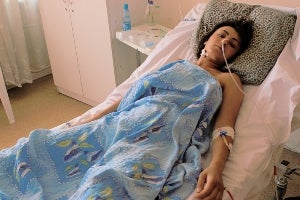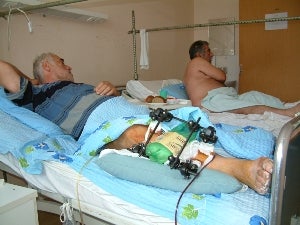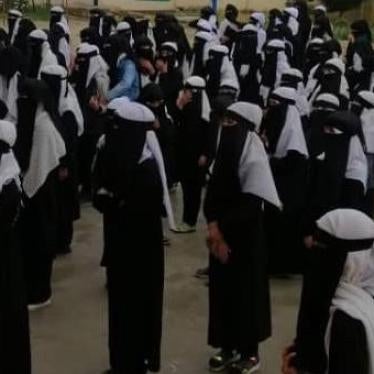Forces on both sides in the conflict between Georgia and Russia appear to have killed and injured civilians through indiscriminate attacks, respectively, on the towns of Gori and Tskhinvali, Human Rights Watch said today. Human Rights Watch expressed its deep concern over the apparently indiscriminate nature of the attacks that have taken such a toll on civilians.
“Russian, Georgian and South Ossetian forces all have an obligation under international humanitarian law to protect civilians from attack,” said Holly Cartner, Europe and Central Asia director at Human Rights Watch. “The latest information on civilian casualties in Gori, Tskhinvali and surrounding areas calls into question whether the forces are respecting that obligation.”
 Keti Javakhishvili, 25, was wounded during an attack on the Georgian town of Gori on August 12, 2008. © 2008 Human Rights Watch |
Attack on Gori town square
An attack on the main square in the Georgian town of Gori on August 12, 2008, killed and injured dozens of civilians, Human Rights Watch said today. The attack took place in the morning in front of the Gori Municipality Administration building, where several dozen civilians had gathered to collect food distributed by local officials. Victims of the attack described to Human Rights Watch how they saw numerous small explosions within seconds before they fell to the ground.
According to victims, at least eight people died immediately, including a Dutch journalist. The injured were initially taken to the Gori hospital, but were evacuated to Tbilisi, the Georgian capital, due to the deteriorating security situation. On August 12, the Gudushauri National Medical Center of Tbilisi admitted 23 civilians from Gori, many of them injured in the morning’s attack.
Although the Russian military initially denied that it was involved in military operations in Gori, Foreign Minister Sergei Lavrov confirmed on August 13 that Russian forces were active in the area. There were also several aerial bombardments of Gori from August 9 through 12 which could only have been carried out by Russian airplanes.
Keti Javakhishvili, 25, told Human Rights Watch researchers in Tbilisi that she went with her neighbors to get bread and was injured in the attack: “I heard an explosion and dropped to the ground.” Javakhishvili suffered massive trauma to her liver, stomach, and intestines, as well as hemorrhagic shock, said Dr. Merab Kiladze, head of the medical center’s surgery department.
Another victim, Nodar Mchedlishvili, 54, told Human Rights Watch that he went to the municipality building to get food to feed eight people displaced from South Ossetian villages. “In a couple of seconds from everywhere I heard what sounded like massive gunfire. We fell on the ground and some people never got up.” Mchedlishvili sustained shrapnel wounds to his left leg and knee. He was driven to Gori hospital in a car with six other victims as part of a convoy of the injured before being transferred to Tbilisi. Giorgi Malkhaziani, 59, whose right leg was shredded as a result of the attack, corroborated Mchedlishvili’s accounts of events.
“The circumstances suggest that Russian forces either carried out the attack on Gori or at least should know of an attack by South Ossetian forces,” said Cartner. “Russia clearly has the duty to investigate this incident as a potential war crime and hold those responsible to account.”
It is unclear whether there was a legitimate military target in the area. The Georgian military were reported to have withdrawn from Gori the previous night. Victims interviewed by Human Rights Watch indicated there was no military presence in the area. The multi-story municipality building is clearly visible, and as a civilian object is protected from targeting.
 Nodar Mchedlishvili, 54, was wounded during an attack that took place in front of the Gori Municipality Administration Building the morning of August 12, 2008. He and other civilians had gathered there to receive food and other humanitarian assistance. © 2008 Human Rights Watch |
Attacks in Tskhinvali
When Human Rights Watch entered Tskhinvali on August 13, the city was largely deserted. Human Rights Watch researchers saw numerous apartment buildings and houses damaged by shelling. Some of them had been hit by rockets most likely fired from Grad launchers, weapons that should not be used in areas populated by civilians, as they cannot be directed at only military targets and are therefore inherently indiscriminate. Also, Human Rights Watch saw several buildings that bore traces of heavy ammunition as if fired from tanks at close range. There was some evidence of firing being directed into basements, locations where civilians frequently choose as a place of shelter.
Since Georgian and Russian forces use identical Soviet-era weapons systems including main battle tanks, Grad multiple-launch rockets, BMP infantry fighting vehicles and tube artillery, Human Rights Watch cannot definitely attribute specific battle damage to a particular belligerent, but witness accounts and the timing of the damage would point to Georgian fire accounting for much of the damage described below.
Human Rights Watch researchers interviewed about 30 individuals, including civilians who had remained in the city during the entire period of the fighting, a few civilians who had just returned to check on the state of their homes, and several members of South Ossetian forces.
One man identified only as Giorgi took Human Rights Watch researchers to his apartment building at 50 Luzhkov Street, which he explained suffered severe damage during fighting that took place between Georgian and South Ossetian forces from August 7 to10. He told them:
-
“They had no pity for civilians. When the fighting started, everyone who remained in the building rushed to the basement. We stayed there for the next two days, unable to step outside because the shelling was so heavy. On August 9, a BMP [infantry fighting vehicle] fired right into the basement, leaving a gaping hole in the wall. The noise was deafening and debris was flying all over the place. My neighbor’s elderly father-in-law was so scared that he started running away, slipped and broke his legs. No one was killed because everyone was in the adjacent room.”
Human Rights Watch saw the hole in the wall, and learned that those in the basement survived only because they were in an adjacent room.
Giorgi also showed Human Rights Watch a completely destroyed building nearby and explained that when the building was hit by a Grad rocket, six of the tenants, four women and two men, (all ethnic Azeris) were thrown from the window by the blast wave and fell to the ground. They suffered severe concussions and multiple bruises, but managed to crawl into the basement and hide there. They were hiding in the basement until August 10, with the neighbors taking care of them.
Casualty numbers in Tskhinvali
A doctor at Tskhinvali Regional Hospital who was on duty from the afternoon of August 7 told Human Rights Watch that between August 6 to12 the hospital treated 273 wounded, both military and civilians. She said her hospital was the only clinic treating the wounded in Tskhinvali. The doctor said there were more military personnel than civilians among the wounded and added that all of the wounded were later transferred to the Russian Ministry of Emergencies mobile hospitals in South and North Ossetia. As of August 13, there were no wounded left in the Tskhinvali hospital.
The doctor also said that 44 bodies had been brought to the hospital since the fighting began, of both military and civilians. The figure reflects only those killed in the city of Tskhinvali. But the doctor was adamant that the majority of people killed in the city had been brought to the hospital before being buried, because the city morgue was not functioning due to the lack of electricity in the city.
From August 8 to 11, the doctor said, staff had to move all the patients into the hospital basement because of the constant shelling. The doctor said the hospital was under fire for 18 hours. Human Rights Watch documented the damage caused to the hospital building by a rocket believed to have been fired from a Grad multiple rocket launcher which hit the hospital, severely damaging treatment rooms on the second and third floors.
The doctor told Human Rights Watch that she could not leave the hospital because of the heavy shelling. She also said that two sisters, hospital employees, were killed on August 8 or 9, as they were hiding in the basement of their house.
Selected accounts of the fighting
Two women living on Luzhkov Street spoke to Human Rights Watch about their ordeal of spending more than two days in the basement of their apartment building, also damaged by shelling. One of them, a teacher at the local kindergarten, said: “They were shooting from Grad rocket launchers, paying no attention to civilians living in these houses. We went deaf from the shelling. They simply wanted to wipe us off the face of the earth.”
The woman showed Human Rights Watch researchers the kindergarten building hit by the Grad rockets, as well as fragments of the rocket itself. The children from the school had been evacuated earlier, and two members of the South Ossetian forces told Human Rights Watch that young volunteer militia had been hiding in the building.
On the neighboring street, witnesses told Human Rights Watch that a woman, who was eight months pregnant, peeped out of the basement on the second day of the fighting, was hit by a stray bullet, and died from her wounds.
Pavel, a man living at 20 Isak Kharevov Street, showed Human Rights Watch his building, which had been completely destroyed by the shelling. He said he spent three days in the basement, together with his wife. He said all the residents of the building were hiding in the basement without food or drinking water. The men took turns trying to fetch water under heavy artillery fire. Pavel told Human Rights Watch that when he went to get water, a shell hit the ground next to him.
Burning and looting of Georgian villages
On August 13, Russian forces seemed to be taking measures to prevent the looting of Georgian villages; the road south from the town of Java to Tskhinvali was closed to members of South Ossetian paramilitary groups. Russian officers at the checkpoint told Human Rights Watch that the road closure was due to the massive looting taking place in Georgian villages along the road.
However, moving back from Tskhinvali to Java on the evening of August 13, Human Rights Watch researchers saw, for the second day running, houses that were ablaze in several Georgian villages. They had clearly just been torched. One counterintelligence officer of the South Ossetian forces claimed to Human Rights Watch that: “We burned these houses. We want to make sure that they [the Georgians] can’t come back, because if they do come back, this will be a Georgian enclave again and this should not happen.”
The officer went on to describe events during the fighting, including the execution of a Georgian armed man: “The day before yesterday [August 11, 2008], the Georgians killed two of my soldiers in the village of Tamarasheni. We had been conducting a sweep operation there. We detained three of them. Two of them didn’t do anything to us so we just let them go – we couldn’t take them anywhere as I had to take care of my own men first. The third one seemed to be high on something – a normal person would have surrendered, and this one was shooting at us instead. We questioned him and then executed him.”
He expressed concern about the ongoing pillaging: “There are looters everywhere in these villages. ... The looters are now moving to Gori (I went there this morning). The fighting there is over, and now the looters are looting there to profit from this war. Someone has to do something about it.”





